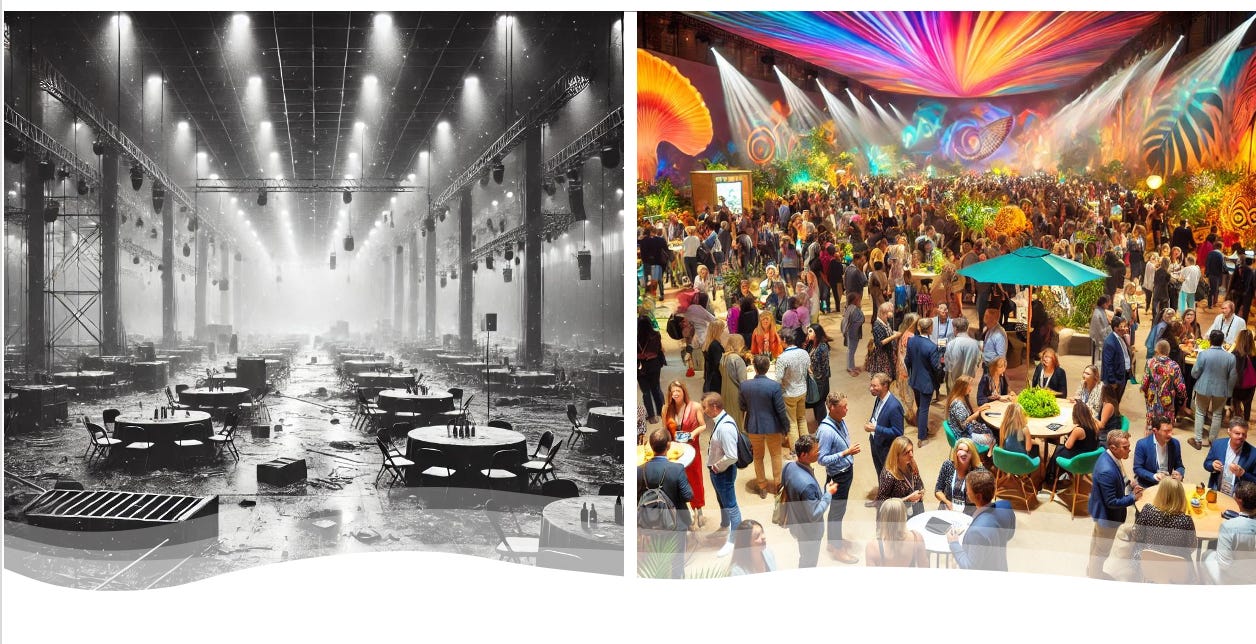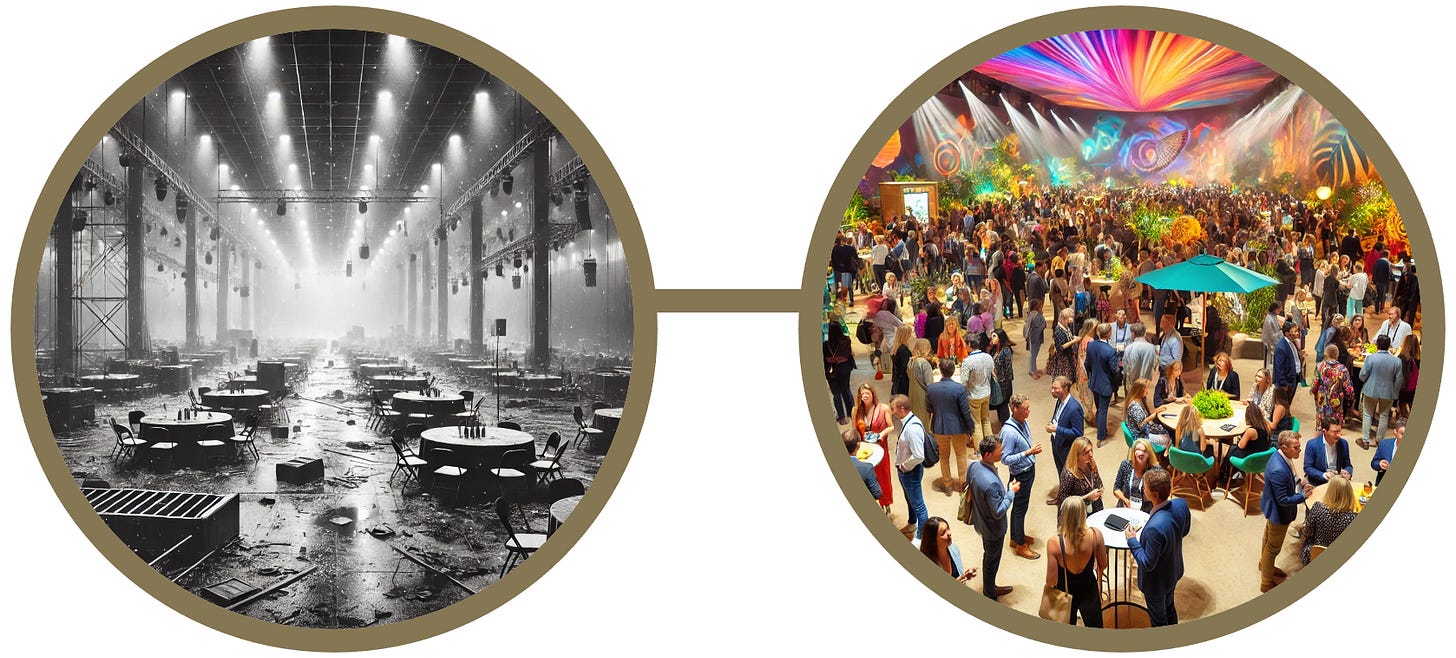Will AI Eat Events?
7 Ways to Keep the Lights On
Depending on who you listen to, Artificial General Intelligence (AGI), or even Superintelligence, might be around the corner. Some experts believe we can reach AGI by 2028 … or even this year.
Here’s Anthropic’s CEO Dario Amodei saying AI could surpass “almost all humans at almost everything” shortly after 2027. Here’s OpenAI’s CEO Sam Altman saying that the first examples may come as soon as this year, initially with minimal impact but eventually “more intense than people think”. Whichever way you look at it, the race to AI dominance will gather pace, not least because of the recent hugely successful entry of China’s DeepSeek (I liked how The Guardian calls it “AI’s Sputnik moment”).
I’ll leave the debate about what will happen precisely when to far more intelligent minds than mine (or you can ask an AI agent!), but what is certain is that:
● At some point, machines will surpass the brightest minds humankind can offer, and
● With the race heating up, that might come sooner than we think.
So, what does this have to do with events?
I’d like to believe that conferences will continue going strong, perhaps getting even better as machines dominate our daily lives. They will provide opportunities to connect in meaningful ways with our fellow professionals and make sense of what’s happening around us.
But will they?
If AGI and Superintelligence completely reshape the job market, society and the economy, will conferences even have a purpose?
While it’s a bit of a doomsday scenario to imagine a future where we’ll have nothing to do but twiddle our thumbs and live off small income grants, what could that mean for the future of events?
AGI and Superintelligence Arrive
With billions being poured into AI, the already staggering pace of AI development is only set to increase. Advances in machine learning, computing power, and data processing are happening so quickly that predictions once labelled as “decades away” now feel right around the corner.
When that happens, AI will be able to do many of our jobs better, faster, and cheaper than we can. Some jobs will disappear. Others will transform entirely.
What does that mean for the people doing those jobs? And what about the companies that rely on them?
On the bright side, AGI could solve some of our biggest problems. It could help cure diseases, tackle climate change, and revolutionise industries. It could create new jobs we don’t even think about today.
But there’s a flip side. Many jobs will be lost. Many people may feel left behind in a world too expensive to play in and/or moving too fast for them to keep up. Economic inequality could deepen.
Even if something like Universal Basic Income cushions the blow for most, the idea of “work” as we know it could fundamentally change. If people don’t have traditional jobs, few growth prospects and little money, why would they want industry events?
Let’s look at two potential scenarios.
Scenario 1: Events are Dead
By 2030, the conference industry is bust. Superintelligence has made human expertise redundant, offering personalised insights that render traditional events outdated. The remaining organisers struggle as AI-driven virtual experiences deliver flawless networking, real-time translation, and instant knowledge sharing at minimal cost. Another blow comes as AI systems predict and solve business challenges before they arise, eliminating the need to seek solutions among your peers.
Professional bodies have collapsed as industries are transformed or wiped out. Event planners, once masters of crafting human experiences, now compete with AI systems that design and execute events with uncanny precision. Speakers, trainers, and facilitators have joined the swelling ranks of the economically displaced. Venues stand empty or repurposed.
Human-centred events become expensive, time-consuming relics. Where they continue to exist, they are sparsely attended, as most can no longer afford in-person events. Nor does the wealthy care; the elite prefer exclusive AI-curated experiences that far surpass human-organised gatherings.
Scenario 2: Long Live Events
As super smart AI takes over our routine tasks, human connections become more valuable. Conferences shift from information exchanges to essential gatherings for authentic experiences and emotional engagement. People attend to navigate rapid changes collectively, harness shared creativity, and uphold our humanity in an AI-driven world.
While AI streamlines event logistics and personalisation, it enhances the importance of face-to-face interactions. Conferences transform into hubs where professionals delve into uniquely human skills: emotional intelligence, ethical decision-making, creative collaboration, and relationship building. The most impactful events are those that highlight and strengthen our distinct human qualities.
With AI handling routine work, we gain more time for meaningful connections. Conferences adapt to this shift, becoming platforms for deep learning, cultural expression, collaborative problem-solving, trust-building, and shared experiences that guide us through the AI revolution together. The goal isn't to compete with AI but to complement it, using technology to enhance our innate abilities to connect, create, and care for one another.
Governments address UBI concerns and implementation complexities. Together with industry bodies and other organisations, there is recognition of the importance of professional events. In addition to new direct revenue streams, there are subsidies for attendance through various sponsorships and grants, ensuring accessibility and sustained engagement.
7 Ideas to Prepare for the Future
No matter where on the scale between Scenario 1 and Scenario 2 you are as an event professional, events will undergo fundamental change like any other industry sector. Here are seven ideas to do now in preparing for the AI-transformed future of events:
1. Develop AI Literacy
Get more comfortable with AI agents and tools now, not just for event management but for understanding how they'll reshape industries in which your events operate.
Consider AI ethics, safety and protocols to design events that responsibly integrate AI (not affecting privacy, bias, and human agency to make their own decisions).
Learn enough to have a meaningful understanding of AI's impact on your participants' professions. Understanding their AI-transformation scales, uncertainties and fears, and opportunities that excite will arm you with designing conference experiences that are relevant and valuable.
2. Master Hybrid Experience Design
Perfect the art of blending physical and digital experiences in ways that amplify rather than diminish human connection. Think about how you could use AI to personalise each participant's journey through the event while keeping human touchpoints at critical moments to create emotional connections.
3. Build Human-Centric Design Skills
Start shifting from pure knowledge transfer to designing memorable shared experiences, and moments machines cannot replicate.
Beyond content-and-exhibition management, develop expertise in creating emotional resonance and meaningful human interactions. Start experimenting with session formats that prioritise genuine connection and collaborative problem-solving over one-way information delivery.
Think about ways to make your exhibition areas immersive experiences, such as through live integrations and sensory engagement. Create breakaway activities to drive small-group interactions or mindfulness zones for reflection.
Understand how one could develop AI-powered sentiment analysis and metrics that capture the value of human interaction – from measuring meaningful connection scores and breakthrough moments to tracking long-term relationship formation and community strength.
4. Enhance Emotional Intelligence
As AI handles more technical aspects, your emotional intelligence will become your most valuable asset. Develop skills in reading room dynamics, facilitating difficult conversations, and creating “psychological” safe spaces for authentic interaction.
5. Embrace Micro-events
Smaller-scale events prioritise personalisation, exclusivity and high-value experiences, allowing for tailored content and more meaningful interactions. They can be standalone or events within events.
Moreover, micro-events offer the flexibility to be hosted in various locations, bringing the event closer to attendees. This approach reduces the need for extensive travel and accommodation, making participation more convenient and, critically, cost-effective for would-be participants.
6. Cultivate Community Building Expertise
Strong communities will become even more crucial as traditional professional structures evolve. Learn to build and nurture communities that extend beyond the event itself. This includes mastering both digital and in-person community engagement techniques.
Consider how partnering with AI can create experiences that combine predictive analytics with real-time human response to deliver in-the-moment value.
7. Consider New Business Innovations
Begin exploring AI-enabled cost reductions, alternative revenue streams and value propositions. Consider models based on community value, experience quality, and human connection rather than purely information delivery or professional development. Think about how to monetise the uniquely human aspects of events.
On the revenue side, the key is to move from transaction-based selling to relationship-based revenue. Not all the opportunities are new, but the impact of intelligent AI will accelerate many. Some examples:
● Develop micro-events and intimate gatherings that foster deeper connections and demand higher value.
● Develop premium membership that blends online and offline experiences. Conferences are just one touchpoint in the year-round engagement strategy.
● Create tiered pricing models where basic content is AI-delivered, but human interaction and experience components command premium prices.
We are all technologists now.
What could possibly go wrong? 😅




Great piece! Cobus, as you know, I attend many media conferences, and I fully agree with the positive potential of AI in events—especially when it comes to automation. As I mentioned in an earlier Substack, AI-driven tools are already transforming event workflows, from streamlining logistics to generating post-event reports and insights with incredible speed and accuracy.
While AI enhances efficiency, the human connection will define the future of events. No machine can replicate the emotional intelligence, shared experiences, and spontaneous moments that make conferences truly valuable. For me, the most successful events are not just about knowledge transfer—they're the ones where attendees have meaningful interaction, creative collaboration, and trust-building, all of which become more important as AI reshapes industries.
The challenge isn’t just adapting to AI—it’s ensuring that, in an increasingly automated world, events remain a place where people come together not just to learn, but to connect.